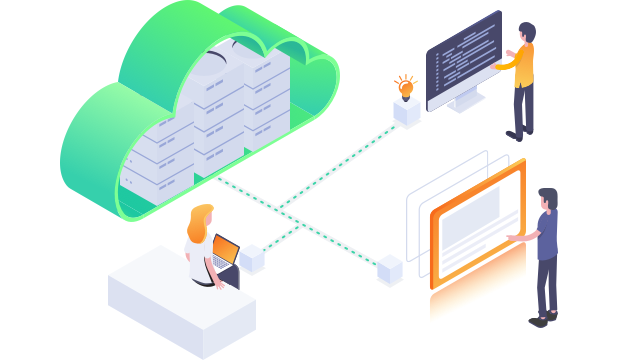GPU Cloud Instance
Our cloud service makes it easy to deploy container-based GPU instances in seconds, from either public or private repositories. This means that you can get started with GPU computing quickly and easily, without having to worry about managing your own hardware.

Cloud Mining
À tout moment et en tout lieu ! Nous nous occupons des processus fastidieux afin que vous puissiez vous détendre en profitant de récompenses. Commencez à miner en quelques clics !
Minerplus
La gestion de votre centre de données vous pose problème ? Nous sommes prêts à vous aider à déployer des systèmes de gestion à interface unique.

Ressources
Parcourez notre centre de ressources pour trouver ce dont vous avez besoin. Abonnez-vous pour rester informé de nos dernières actualités, annonces et publications.
Abonnez-vous à notre bulletin d’informations
Blog sur les crypto et le minage de Bitcoin . Apr 04 2023
Cryptocurrency Profile – Zcash (ZEC)
Zcash (ZEC) is a decentralized cryptocurrency that offers anonymity with a total supply of 21 million tokens.

ZEC in a Nutshell
What is Zcash? Zcash (ZEC) is a decentralized cryptocurrency that offers anonymity with a total supply of 21 million tokens. It is a fork of Bitcoin with code changesbased on Bitcoin Core version 0.11.2. Same as Bitcoin, ZEC uses Proof-of-Work (POW) as its consensus mechanism, so users obtain ZEC through mining. When a new block is added to the blockchain, a new ZEC with a time interval of 2.5 minutes is created. You can mine ZEC with Bitdeer’s Antminer Z15 cloud hashrate plan by ordering the corresponding hashrate plan.
Zcash employs a set of zero-knowledge proof protocols known as zk-SNARK to improve anonymity. In the ZEC payment process, information, such as the sender, recipient, and value of all transactions, are kept confidential and are only accessible to the key owner. Users have complete control and can opt-in to provide others with their viewing key at their discretion. Zcash not only provides complete payment confidentiality, but also enables one to maintain a decentralized network using a public blockchain.
ZEC’s Inception
Silk Road, the world's largest online black market, was founded in 2011. In the market, users traded anonymously with Bitcoin. Following a two-year undercover operation on Silk Road, the FBI arrested its founder and shut it down. After the Silk Road incident, Zooko Wilcox established the Zerocoin project, gradually improving the efficiency and anonymity of the original Zcash protocol (i.e. "Zerocash") in collaboration with teams from Johns Hopkins University, MIT, Technion-Israel Institute of Technology and Tel Aviv University.
On January 20, 2016, Zooko Wilcox officially announced the launch of the Zcash project, an evolution of the Zerocoin project. With the emergence of new protocol, the independent cryptocurrency Zcash was born.
Principle of ZEC
Zcash employs two technologies: zk-SNARK, a zero-knowledge proof protocol, and a public blockchain. Although Zcash transaction data is posted to a public blockchain, zero-knowledge proofs allow transactions to be verified without revealing the sender, receiver or transaction amount. The key owner (i.e., the token owner) can share relevant details with others via a viewing key that grants read access.
Zcash has two types of addresses: private addresses starting with a "z" and transparent addresses starting with a "t". A z-to-z transaction appears on the public blockchain, so it is known to have occurred and that the fees were paid. But the addresses, transaction amount, and the memo field are encrypted and not visible to the public. This type of encryption on the blockchain is only possible through the use of zero-knowledge proofs. The owner of an address may choose to disclose the z-address and transaction details with trusted third parties through the use of viewing keys and payment disclosure.
This allows for selective disclosure to trusted third parties, where transactions are auditable. On the other hand, a transaction between two transparent addresses works the same way as Bitcoin. The sender, the receiver, and the amount of the transaction are publicly visible. While many wallets and exchanges exclusively use t-addresses today, many are moving to shielded addresses to better protect user privacy. The two Zcash address types are interoperable, and funds can be transferred between z-addresses and t-addresses.
Advantages of ZEC
The privacy-enhancing features of ZEC may make it a more resilient store of value than BTC, as selective disclosure makes it less vulnerable to government intervention.
ZEC can also serve as a privatized global currency that facilitates free trade in a secure and trustless manner. As a privatized medium of exchange for low-cost and real-time cross-border transactions, ZEC can capture a portion of economic surplus from the open trade it facilitates.
Milestones
⬤ January 20, 2016 —— The Zcash project released its alpha version.
⬤ October 28, 2016 —— The Zcash Genesis Block was mined and the Zcash project was officially launched.
⬤ July 19, 2019 —— Zcash forked into YCash.
⬤ July 2020 —— Zcash completed the Heartwood network upgrade.
⬤ November 18, 2020 —— Zcash output halved and block rewards were reduced from 6.25 ZEC to 3.125 ZEC.
⬤ July 1, 2021 —— Zcash activated the NU5 test network upgrade.
⬤ August 2022 —— The Zcash development team released a new proposal Zcash Posterity Fund (ZPF).
Answer the following questions to test your ZEC knowledge!
- What are the main features of ZEC?
- What is the total supply of ZEC?
- From which coin did ZEC fork?
DISCLAIMER
*Information provided in this article is for general information and reference only and does not constitute nor is intended to be construed as any advertisement, professional advice, offer, solicitation, or recommendation to deal in any product. No guarantee, representation, warranty or undertaking, express or implied, is made as to the fairness, accuracy, timeliness, completeness or correctness of any information, or the future returns, performance or outcome of any product. Bitdeer expressly excludes any and all liability (to the extent permitted by applicable law) in respect of the information provided in this article, and in no event shall Bitdeer be liable to any person for any losses incurred or damages suffered as a result of any reliance on any information in this article.








